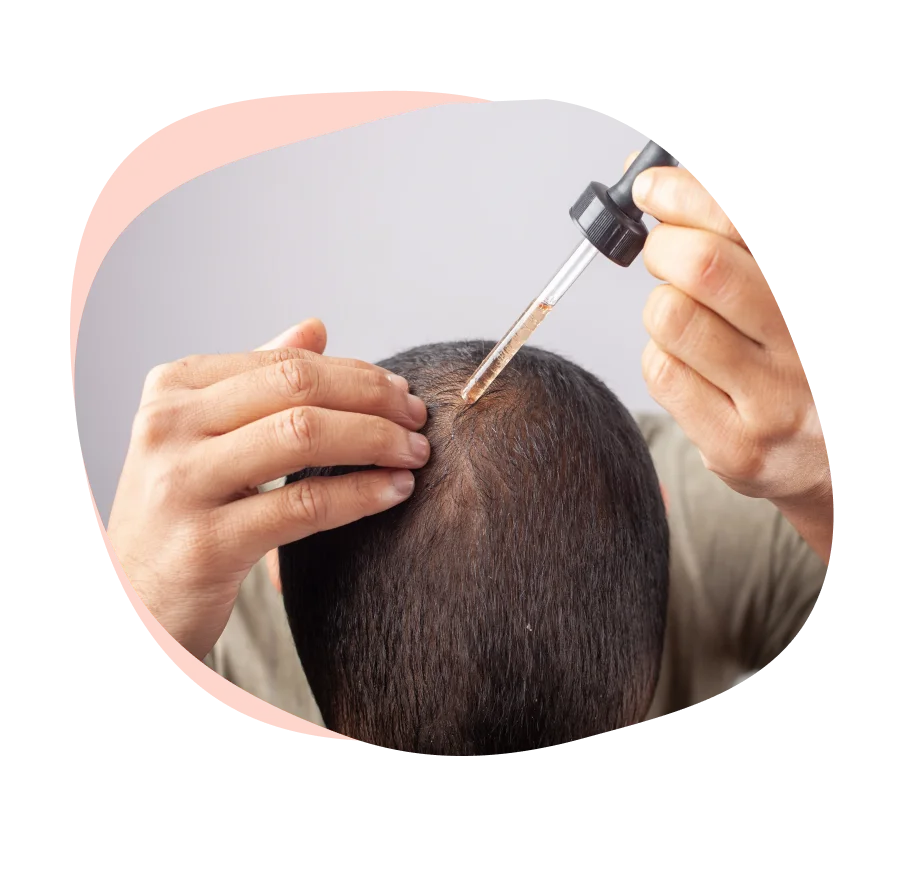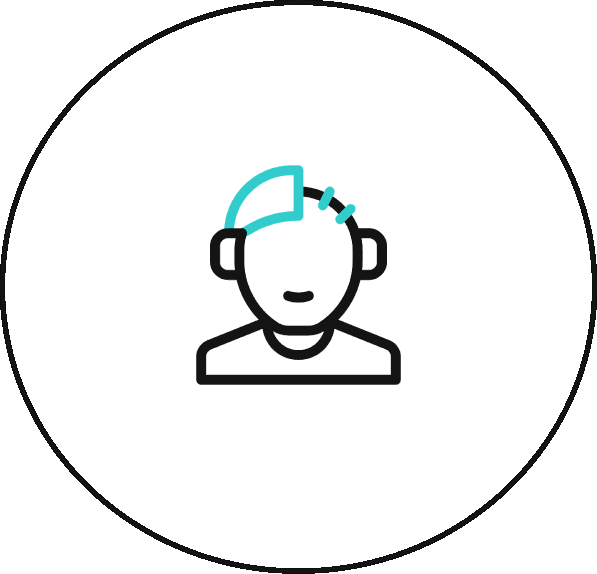Home | Hair Medications | Minoxidil
Minoxidil![]()
For over three decades, Minoxidil, the key ingredient in Regaine, has been a cornerstone in the fight against male and female pattern baldness. Available over the counter in liquid or foam formulations, Minoxidil has demonstrated its effectiveness as a potent remedy for addressing this prevalent concern.
However, there’s a caveat: Minoxidil is not a universal solution. It targets specific types of baldness and requires consistent application for optimal results. Patience is paramount, as visible changes may take up to four months to manifest. Continuous usage is crucial for sustaining the achieved regrowth.
Minoxidil operates through vasodilation. By enlarging hair follicles and prolonging the hair growth phase, it facilitates increased scalp coverage.
Nevertheless, it’s important to note that Minoxidil is not a permanent fix. Its effects hinge on continued usage; discontinuation may result in a return to the previous state.
Minoxidil targets individuals experiencing male or female pattern baldness – the most common form of hair loss with genetic predispositions. It delivers optimal results when initiated at the earliest signs of hair loss. Minoxidil’s efficacy is most pronounced on the vertex of the scalp, the crown area, and the receding hairline in men.
Not all instances of hair loss respond to over-the-counter medications like Minoxidil. If your hair loss presents as sudden patches of shedding, postpartum hair loss, or a scalp that is itchy, discolored, infected, or painful, Minoxidil may not provide the solution.
It’s crucial to recognize that Minoxidil is ineffective against hair loss caused by external factors such as harsh hair products, chemical treatments, hair grooming techniques, or underlying medical conditions like thyroid disorders. Furthermore, if nutritional deficiencies or scalp scarring are involved, it’s advisable to refrain from using Minoxidil – or any topical or oral medication – without a doctor’s recommendation.




As a topical treatment, Minoxidil is generally considered safe, with mild side effects being the most common. These may include scalp irritation, hair growth in adjacent areas (such as the forehead), changes in hair texture or color, and eye irritation.
While serious side effects are rare, vigilance is necessary. Look out for sudden, unexplained weight gain, dizziness, swollen extremities, or chest discomfort. If any of these symptoms arise, prompt consultation with your doctor is advised.


Premier Surgeons: Expert alumni from AIIMS Delhi with 10+ years of experience.


Maximum Viability: Optimize graft survival with cutting-edge advanced Technology (Realtime Bio- Enhanced FUE)


Natural Hairline Design: Achieve the most natural hairline with 3000+ success stories.


Uncompromised Safety: 100% doctor-led surgeries with strict safety protocols.
Minoxidil![]()
![]()
![]()
Minoxidil is the active ingredient in Rogaine, which is a topical treatment for hair loss. Minoxidil, available over the counter, is commonly known as Regaine. It is a potent solution for combating hair loss.
Hair loss is not just a cosmetic concern; it often comes with emotional stress. Consulting a doctor or trichology specialist is crucial to diagnose the underlying cause of hair loss and receive tailored solutions that match individual requirements.
Minoxidil works through vasodilation, which enlarges hair follicles and prolongs the growth phase of hair. This leads to increased hair coverage on the scalp. However, it’s important to note that Minoxidil’s effects are contingent on continued use; discontinuation might result in a return to the previous hair loss status.
Minoxidil is most effective for individuals dealing with male or female pattern baldness, which has genetic underpinnings. It works best when started at the earliest signs of hair loss and is particularly effective on the vertex of the scalp, the crown area, and the receding hairline in men.
Minoxidil may not be suitable for all types of hair loss. It is less effective for hair loss resulting from factors like sudden patchy shedding, postpartum hair loss, scalp issues (itchiness, discoloration, infection, or pain), external factors (harsh hair products, chemical treatments, grooming methods), or underlying medical conditions like thyroid problems. It’s advisable to use Minoxidil only with a doctor’s endorsement when nutritional deficiencies or scalp scarring are involved.
Minoxidil is generally considered safe, with mild side effects. Common side effects include scalp irritation, hair growth in adjacent areas (like the forehead), changes in hair texture or color, and eye irritation.
Serious side effects of Minoxidil are rare but require vigilance. Watch out for sudden, unexplained weight gain, dizziness, swollen extremities, or chest discomfort. If any of these conditions arise, it’s essential to consult a doctor immediately.
Reach Out for a Hair Transformation Today!
Delhi: C-26, First Floor, Greater Kailash 1, New Delhi, 110048, India
Bhubaneswar: 2nd Floor, D 1 Square , Nandan Kanan Road , KIIT Square, Patia, Bhubaneswar, Odisha 751024
Uttarakhand: Gularbhoj Rd, near The Royal Gym, Dineshpur, Gurunanakpur, Uttarakhand 263160
Chennai: 39/2, RK Shanmugam Salai, Goutham Colony, K. K. Nagar, Chennai, Tamil Nadu 600078
Copyright @ 2024 Quizox Helath care pvt. ltd. All rights reserved.
SEO content goes here.





At AllôRoots, we are a team of experienced dermatologists and hair transplant surgeons, alumni of AIIMS, Delhi; Led by Dr. Alok Sahoo (MBBS, MD AIIMS, New Delhi). We are committed to innovation, providing clinically proven solutions for all hair restoration, with customized plans prescribed exclusively by experienced doctors.
Beyond hair transplants, Alloroots offers an extensive suite of services, including Hair fall treatment, Scalp Micropigmentation, Beard & Eyebrow restoration, regenerative hair treatments , PRP and GFC.
Email: info@alloroots.com
Number: +91 9717503031





Copyright @ 2024 Quizox Helath care pvt. ltd. All rights reserved.
The Robotic Hair Transplant using Advanced DHI (Direct Hair Implantation) is a cutting-edge solution for those seeking precise and minimally invasive hair restoration. This technique combines robotics and the DHI method to ensure accurate placement of hair follicles, resulting in a natural hairline and optimal density. Ideal for those looking for advanced hair restoration options with minimal downtime.
Keywords: advanced hair restoration, robotic hair transplant, DHI hair transplant, minimally invasive hair surgery.
The FUE (Follicular Unit Extraction) Hair Transplant is a popular technique for achieving natural-looking results without linear scarring. This method involves extracting individual hair follicles from a donor area and implanting them into thinning or balding regions. FUE is known for its precision, shorter recovery time, and suitability for those with active lifestyles.
Keywords: FUE hair transplant, scarless hair transplant, hair restoration, natural hair regrowth.
The FUT (Follicular Unit Transplantation) Hair Transplant is a traditional yet highly effective method for treating extensive hair loss. This technique involves removing a strip of scalp from the donor area, which is then dissected into individual follicular units for implantation. FUT is often recommended for patients requiring a large number of grafts.
Keywords: FUT hair transplant, strip method hair transplant, extensive hair loss treatment, hair restoration surgery.
Tractional Alopecia is hair loss caused by constant pulling or tension on the hair. This condition is common among individuals who frequently wear tight hairstyles such as braids, ponytails, or extensions. Our specialized treatment for Tractional Alopecia focuses on restoring hair growth by addressing the underlying causes and offering both medical and surgical solutions.
Keywords: tractional alopecia treatment, hair loss from tight hairstyles, hair regrowth solutions, alopecia treatment.
Male Pattern Baldness, also known as androgenetic alopecia, is the most common type of hair loss in men. Our treatment options for Male Pattern Baldness range from non-surgical therapies such as medications and laser therapy to advanced surgical procedures like hair transplantation. We tailor each treatment plan to the individual’s needs, ensuring the best possible results.
Keywords: male pattern baldness, androgenetic alopecia treatment, hair loss in men, hair restoration solutions.
Female Pattern Hair Loss affects many women and can be distressing. This condition typically presents as thinning hair across the scalp and is often related to hormonal changes, genetics, or aging. Our treatments for Female Pattern Hair Loss include a variety of non-surgical and surgical options, designed to restore hair density and improve overall hair health.
Keywords: female pattern hair loss, women’s hair loss treatment, hair thinning in women, hair restoration for women.
Platelet-Rich Plasma (PRP) therapy is a revolutionary non-surgical treatment for hair loss. PRP involves using the patient’s own blood, processed to concentrate the platelets, which are then injected into the scalp to stimulate hair growth. This treatment is effective for both men and women and can be used in conjunction with other hair restoration procedures.
Keywords: PRP for hair loss, platelet-rich plasma therapy, non-surgical hair restoration, hair growth stimulation.
Laser Hair Therapy utilizes low-level lasers to stimulate hair follicles and promote hair growth. This non-invasive treatment is ideal for both men and women experiencing early to moderate hair loss. Laser therapy works by increasing blood flow to the scalp, enhancing cellular activity, and revitalizing hair follicles.
Keywords: laser hair therapy, low-level laser therapy, hair regrowth treatment, non-invasive hair restoration.
Hair Loss Surgery includes various surgical techniques designed to restore hair to thinning or balding areas. From FUE and FUT to more advanced methods, our hair loss surgeries are tailored to meet the individual needs of each patient. These procedures offer permanent solutions for those seeking to regain their natural hairline.
Keywords: hair loss surgery, hair transplant surgery, permanent hair restoration, surgical hair restoration.
Hair Regrowth Treatments encompass a range of solutions aimed at stimulating hair growth and preventing further hair loss. These treatments include topical applications, oral medications, and advanced therapies like PRP and laser treatments. Our customized approach ensures effective results based on the specific needs of each patient.
Keywords: hair regrowth treatments, hair growth solutions, hair restoration therapies, non-surgical hair treatments.
Scalp Micropigmentation (SMP) is a non-surgical procedure that creates the appearance of a fuller head of hair by applying tiny pigment deposits to the scalp. This technique is ideal for those looking to camouflage hair loss or achieve the look of a closely shaved head. SMP offers a realistic and durable solution for various types of hair loss.
Keywords: scalp micropigmentation, hair tattoo, non-surgical hair restoration, hair loss camouflage.
A comprehensive Hair Loss Consultation is the first step toward finding the most effective treatment for your hair loss concerns. Our experts provide a thorough evaluation, discuss various treatment options, and develop a personalized plan to address your specific needs. Schedule a consultation to explore the best solutions for your hair restoration journey.
Keywords: hair loss consultation, hair restoration evaluation, personalized hair loss treatment, expert hair loss advice.





Copyright @ 2024 Quizox Helath care pvt. ltd. All rights reserved.
Alloroots | Hair Transplant Clinic in Delhi, NCR, Bhubaneswar, Chennai, Dehradun | Best Hair Transplant Clinic in India – Expert Doctor & Best Cost
The Robotic Hair Transplant using Advanced DHI (Direct Hair Implantation) is a cutting-edge solution for those seeking precise and minimally invasive hair restoration. This technique combines robotics and the DHI method to ensure accurate placement of hair follicles, resulting in a natural hairline and optimal density. Ideal for those looking for advanced hair restoration options with minimal downtime.
Keywords: advanced hair restoration, robotic hair transplant, DHI hair transplant, minimally invasive hair surgery.
The FUE (Follicular Unit Extraction) Hair Transplant is a popular technique for achieving natural-looking results without linear scarring. This method involves extracting individual hair follicles from a donor area and implanting them into thinning or balding regions. FUE is known for its precision, shorter recovery time, and suitability for those with active lifestyles.
Keywords: FUE hair transplant, scarless hair transplant, hair restoration, natural hair regrowth.
The FUT (Follicular Unit Transplantation) Hair Transplant is a traditional yet highly effective method for treating extensive hair loss. This technique involves removing a strip of scalp from the donor area, which is then dissected into individual follicular units for implantation. FUT is often recommended for patients requiring a large number of grafts.
Keywords: FUT hair transplant, strip method hair transplant, extensive hair loss treatment, hair restoration surgery.
Tractional Alopecia is hair loss caused by constant pulling or tension on the hair. This condition is common among individuals who frequently wear tight hairstyles such as braids, ponytails, or extensions. Our specialized treatment for Tractional Alopecia focuses on restoring hair growth by addressing the underlying causes and offering both medical and surgical solutions.
Keywords: tractional alopecia treatment, hair loss from tight hairstyles, hair regrowth solutions, alopecia treatment.
Male Pattern Baldness, also known as androgenetic alopecia, is the most common type of hair loss in men. Our treatment options for Male Pattern Baldness range from non-surgical therapies such as medications and laser therapy to advanced surgical procedures like hair transplantation. We tailor each treatment plan to the individual’s needs, ensuring the best possible results.
Keywords: male pattern baldness, androgenetic alopecia treatment, hair loss in men, hair restoration solutions.
Female Pattern Hair Loss affects many women and can be distressing. This condition typically presents as thinning hair across the scalp and is often related to hormonal changes, genetics, or aging. Our treatments for Female Pattern Hair Loss include a variety of non-surgical and surgical options, designed to restore hair density and improve overall hair health.
Keywords: female pattern hair loss, women’s hair loss treatment, hair thinning in women, hair restoration for women.
Platelet-Rich Plasma (PRP) therapy is a revolutionary non-surgical treatment for hair loss. PRP involves using the patient’s own blood, processed to concentrate the platelets, which are then injected into the scalp to stimulate hair growth. This treatment is effective for both men and women and can be used in conjunction with other hair restoration procedures.
Keywords: PRP for hair loss, platelet-rich plasma therapy, non-surgical hair restoration, hair growth stimulation.
Laser Hair Therapy utilizes low-level lasers to stimulate hair follicles and promote hair growth. This non-invasive treatment is ideal for both men and women experiencing early to moderate hair loss. Laser therapy works by increasing blood flow to the scalp, enhancing cellular activity, and revitalizing hair follicles.
Keywords: laser hair therapy, low-level laser therapy, hair regrowth treatment, non-invasive hair restoration.
Hair Loss Surgery includes various surgical techniques designed to restore hair to thinning or balding areas. From FUE and FUT to more advanced methods, our hair loss surgeries are tailored to meet the individual needs of each patient. These procedures offer permanent solutions for those seeking to regain their natural hairline.
Keywords: hair loss surgery, hair transplant surgery, permanent hair restoration, surgical hair restoration.
Hair Regrowth Treatments encompass a range of solutions aimed at stimulating hair growth and preventing further hair loss. These treatments include topical applications, oral medications, and advanced therapies like PRP and laser treatments. Our customized approach ensures effective results based on the specific needs of each patient.
Keywords: hair regrowth treatments, hair growth solutions, hair restoration therapies, non-surgical hair treatments.
Scalp Micropigmentation (SMP) is a non-surgical procedure that creates the appearance of a fuller head of hair by applying tiny pigment deposits to the scalp. This technique is ideal for those looking to camouflage hair loss or achieve the look of a closely shaved head. SMP offers a realistic and durable solution for various types of hair loss.
Keywords: scalp micropigmentation, hair tattoo, non-surgical hair restoration, hair loss camouflage.
A comprehensive Hair Loss Consultation is the first step toward finding the most effective treatment for your hair loss concerns. Our experts provide a thorough evaluation, discuss various treatment options, and develop a personalized plan to address your specific needs. Schedule a consultation to explore the best solutions for your hair restoration journey.
Keywords: hair loss consultation, hair restoration evaluation, personalized hair loss treatment, expert hair loss advice.


Let us get in touch to help you out!
“Check our results page for the best hairline designs”